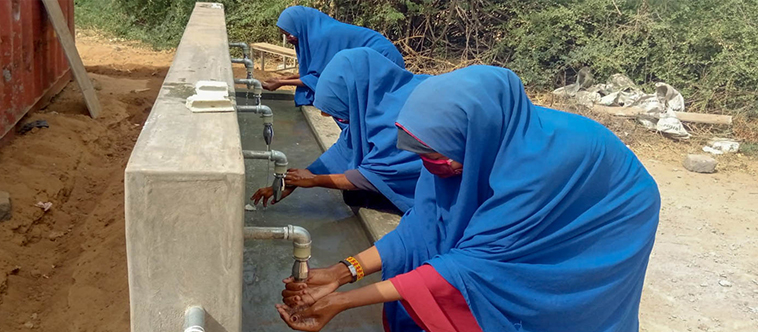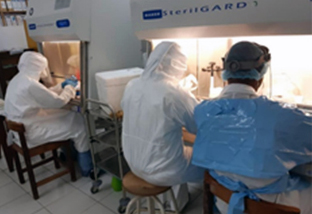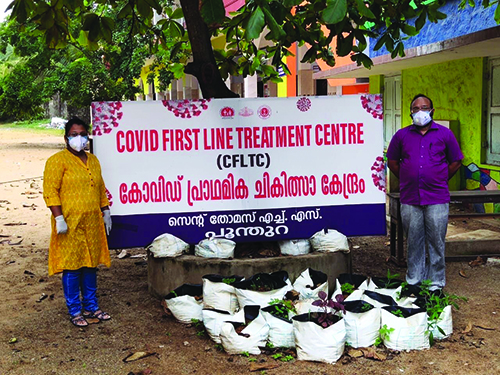Global Programs Help Countries Adapt to COVID-19

Three female students at the Juba Primary School in Dagahaley camp, inside Kenya’s Dadaab refugee camp, wash their hands at a washing station built with support from CDC and CARE International. Proper hand hygiene was a key recommendation early in the COVID-19 pandemic when masks were not always available and vaccines had not been developed. Credit: Peter Mndanyi/CARE Kenya.
CDC’s decades old collaborations with WHO and partner countries on global health security and other shared priorities have helped to build strong foundations for COVID-19 pandemic response efforts around the world.
Since the earliest days of the pandemic in 2020, CDC country offices have pivoted available personnel, existing relationships, and critical resources and on-the-ground assets to support partner countries’ COVID-19 responses in a variety of ways. CDC’s country offices rapidly and effectively leveraged investments to respond to the pandemic, most notably from the U.S. President’s Emergency Plan for AIDS Relief (PEPFAR), Global Health Security, as well as polio, measles and influenza relationships and platforms that were already in place before the pandemic. CDC’s long-standing partnerships and investments in supporting enhanced global surveillance systems, improving disease detection capacity, expanding adaptable laboratory networks, strengthening emergency management, and developing a well-trained workforce are key cornerstones of the global pandemic response.
Healthcare access challenges and the recent earthquake resulted in decreased COVID-19 testing throughout Haiti. To address this issue, CDC developed additional COVID-19 testing sites, using the same model as the HIV and tuberculosis programs. As a result of this technical assistance to the Ministry of public Health and Population (MSPP), citizens can get tested for COVID-19 at pharmacies, private sector labs, and at both international airports. CDC also facilitated the donation of 500,000 Moderna COVID-19 vaccine doses a week in July. CDC continues to support the MSPP in identifying ways to increase vaccine uptake in the population.
Côte d’Ivoire Reference Laboratory Now Serves West Africa with CDC Support
One of CDC’s accomplishments in Côte d’Ivoire was the establishment of the Retro-Côte d’Ivoire (Retro-CI) laboratory in Abidjan with collaboration from the Ministry of Health and Public Hygiene (MSHP) and the Pasteur Institute of Côte d’Ivoire.
In November 2021, Retro-CI was designated by WHO as a prequalification site for HIV serology and nucleic acid testing. It is one of only 14 such laboratories worldwide, and the first in West Africa. Retro-CI’s international accreditation allows it to serve as a reference center for the West African region.
Before this designation, Retro-CI was already a recognized reference center for the country’s laboratory network. Retro-CI is a leader providing life-saving HIV diagnostics support to hundreds of thousands of people in Côte d’Ivoire each year.
In 2019, with support from PEPFAR and a goal of long-term sustainability, CDC initiated a five-year transition process for the Retro-CI laboratory. During this period, MSHP will gradually assume operational responsibilities for routine activities, and CDC will continue to provide support for more complex work.
Retro-CI works on COVID-19
Leveraging the gains and experience from the PEPFAR program to support the national COVID-19 response illustrates the adaptive and innovative approach that CDC uses to support national public health programs. In countries around the world, CDC’s support for a specific disease serves as a foundation for broader gains across the public health spectrum.
Retro-CI supported COVID-19 response activities in Côte d’Ivoire at the start of the pandemic. In March 2020, when the Pasteur Institute diagnosed the country’s first COVID-19 case, Retro-CI performed COVID-19 testing.
CDC and Retro-CI staff provided technical assistance to the broader laboratory network across the region on testing protocols and international guidance for biosafety and waste management. The work CDC began in Côte d’Ivoire in 1988 has developed critical laboratory capacity in response to the HIV epidemic and emergent infectious diseases.

COVID-19 testing begins at Retro-CI, May 2020 Credit: CDC Global.
CDC Country Offices Respond to COVID-19 Around the World
Decades of collaboration between CDC and the Government of India have built strong foundations for India’s response to COVID-19. The Government of India reported its first case on the same day that WHO first declared COVID-19 a Public Health Emergency of International Concern. CDC’s country office in India mobilized immediately, establishing teams that aligned closely with Government of India response efforts across the country. CDC efforts helped to control cases and deaths by leveraging existing collaborations that strengthened India’s core public health capabilities such as disease surveillance, infection prevention and control, emergency response, public health laboratories, and a well-trained public health workforce. CDC supported efforts to establish a fully functioning Government of India Incident Management System and assisted with response and mitigation efforts, including COVID-19 clinical management, risk communication, hospital and community mitigation activities, and a tiered training program to establish a specialized cadre of epidemiologists in India.

CDC supported EIS officers at COVID-19 first-line treatment centre at Poonthura, Kerala, 2020. This site used to be a school before it was converted into a treatment centre during COVID-19 outbreak investigation. Credit: CDC India Office.
Through CDC’s field epidemiology training program and in close collaboration with India’s Epidemic Intelligence Service program, CDC-trained public health experts are fully incorporated into the Government of India’s public health workforce, including many who have had critical roles in outbreak investigation and overall response efforts throughout the pandemic. CDC supports pandemic response efforts at the national and subnational level, providing direct support to some of the highest priority, hard-to-reach, and most vulnerable states identified by the Government of India. In addition, throughout the pandemic, CDC has provided critical support for outbreak response and contact tracing efforts within the U.S. Embassy.